Fuel Injection Fuel Rail Assembly Replacement VIN K
Removal Procedure
Notice: Cap the fittings and plug the holes when servicing the fuel system in order to prevent dirt and other contaminants from entering the open pipes and passages.
Important: When servicing the fuel rail assembly, precautions must be taken to prevent dirt and other contaminants from entering the fuel passages. It is recommended that the fittings be capped, and the holes be plugged during servicing.
Important: Always maintain cleanliness when servicing fuel system components.
- Relieve the fuel pressure from the fuel system. Refer to Fuel Pressure Relief
- Clean the fuel rail assembly and connections.
- Disconnect the fuel feed, (1) and return pipes (2) from the fuel rail tubes. Refer to Metal Collar Quick Connect Fitting Service .
- Disconnect the vacuum line from the fuel pressure regulator.
- Remove the ignition coil wires.
- Disconnect the (6) injector electrical connectors.
- Remove the fuel rail hold-down bolts.
- Remove the fuel rail with equal force on both sides of the fuel rail.
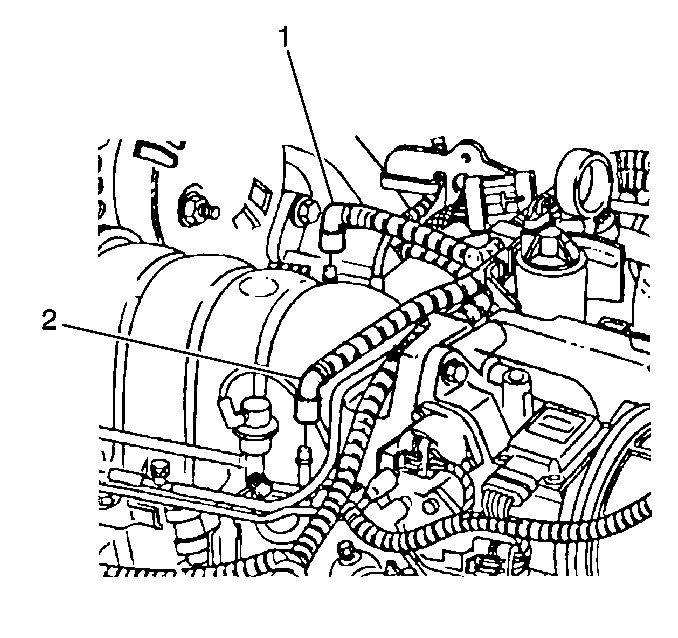
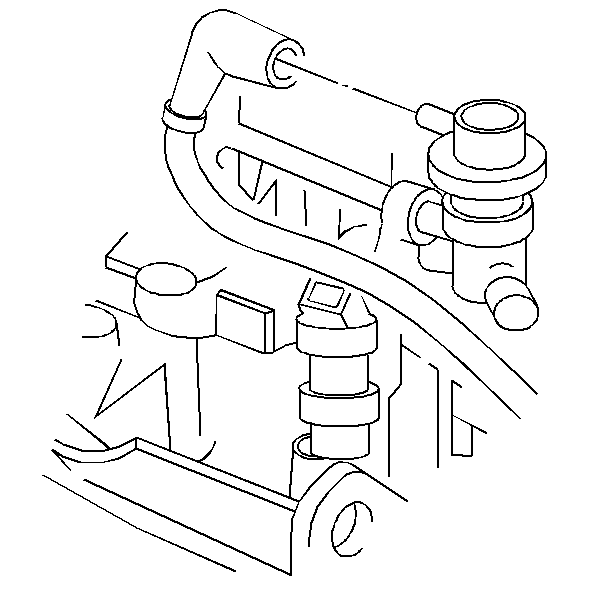
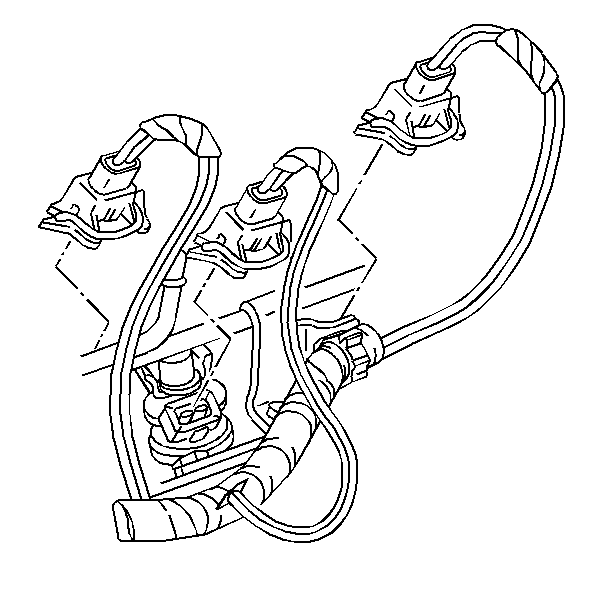
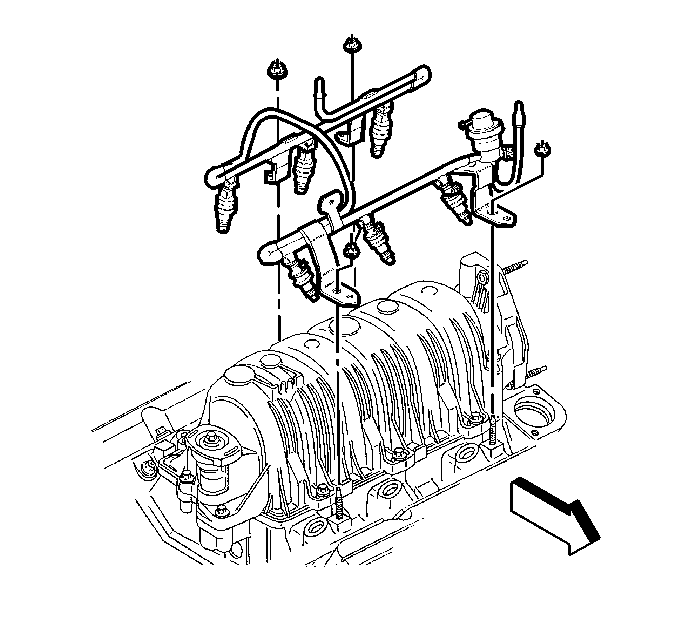
Installation Procedure
Caution: In order to reduce the risk of fire and personal injury that may result from a fuel leak, always install the fuel injector O-rings in the proper position. If the upper and lower O-rings are different colors (black and brown), be sure to install the black O-ring in the upper position and the brown O-ring in the lower position on the fuel injector. The O-rings are the same size but are made of different materials.
Notice:
• Use care when servicing the fuel system components, especially
the fuel injector electrical connectors, the fuel injector tips, and
the injector O-rings. Plug the inlet and the outlet ports of the fuel rail
in order to prevent contamination. • Do not use compressed air to clean the fuel rail assembly as this
may damage the fuel rail components. • Do not immerse the fuel rail assembly in a solvent bath in order
to prevent damage to the fuel rail assembly.
- The O-rings must be replaced on all components that are serviced.
- Lightly oil the fuel injector O-rings with clean motor oil.
- Place the fuel rail assembly on the intake manifold.
- Seat the fuel injectors by HAND.
- Install the fuel rail hold down bolts.
- Connect the (6) fuel injector electrical connectors.
- Connect the fuel feed (1) and return (2) pipes to the fuel rail tubes. Refer to Metal Collar Quick Connect Fitting Service .
- Connect the vacuum line to the fuel pressure regulator.
- Reinstall the ignition coil wires.
- Tighten the fuel fill cap.
- Reconnect the negative battery cable. Refer to Battery Negative Cable Disconnection and Connection in engine electrical.
- Inspect for leaks.
- Reinstall the fuel injection sight shield. Refer to Fuel Injector Sight Shield Replacement in engine mechanical.

Notice: Use the correct fastener in the correct location. Replacement fasteners must be the correct part number for that application. Fasteners requiring replacement or fasteners requiring the use of thread locking compound or sealant are identified in the service procedure. Do not use paints, lubricants, or corrosion inhibitors on fasteners or fastener joint surfaces unless specified. These coatings affect fastener torque and joint clamping force and may damage the fastener. Use the correct tightening sequence and specifications when installing fasteners in order to avoid damage to parts and systems.
Tighten
Torque the fuel rail hold-down bolts to 10 N·m (7 lb ft).



| 12.1. | Turn the ignition switch ON for 2 seconds. |
| 12.2. | Turn the ignition switch OFF for 10 seconds. |
| 12.3. | Turn the ignition switch ON. |
| 12.4. | Check for fuel leaks. |
Fuel Injection Fuel Rail Assembly Replacement VIN 1
Removal Procedure
Notice:
• Use care when servicing the fuel system components, especially
the fuel injector electrical connectors, the fuel injector tips, and
the injector O-rings. Plug the inlet and the outlet ports of the fuel rail
in order to prevent contamination. • Do not use compressed air to clean the fuel rail assembly as this
may damage the fuel rail components. • Do not immerse the fuel rail assembly in a solvent bath in order
to prevent damage to the fuel rail assembly.
Important: When servicing the fuel rail assembly, precautions must be taken to prevent dirt and other contaminants from entering the fuel passages. It is recommended that the fittings be capped, and the holes be plugged during servicing.
- Relieve the fuel pressure from the fuel system. Refer to Fuel Pressure Relief .
- Clean the fuel rail assembly and connections.
- Remove the fuel feed, (2) and return pipes (1) from the fuel rail tubes. Refer to Metal Collar Quick Connect Fitting Service .
- Disconnect the vacuum line from the fuel pressure regulator.
- Remove the ignition coil wires from the coil and retainer clips on top of super charger.
- Remove the generator and rear generator mounting bracket. Refer to Generator Replacement in engine electrical.
- Remove the bypass valve actuator. Refer to Supercharger Bypass Valve Actuator Replacement .
- Disconnect the (6) fuel injector electrical connectors.
- Remove the fuel injector electrical harness clips holding harness to front of fuel rail.
- Remove the fuel rail hold-down bolts (4).
- Remove the fuel rail hold down stud (1).
- Remove the fuel rail with equal force on both sides of the fuel rail.
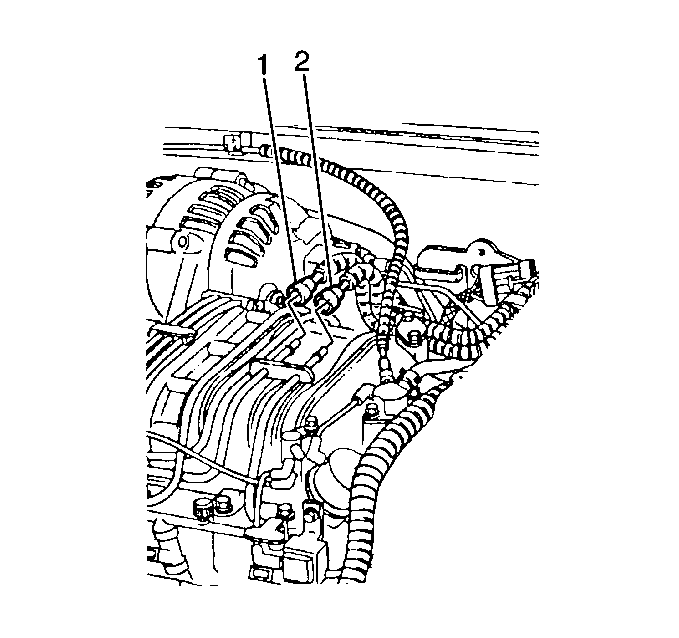


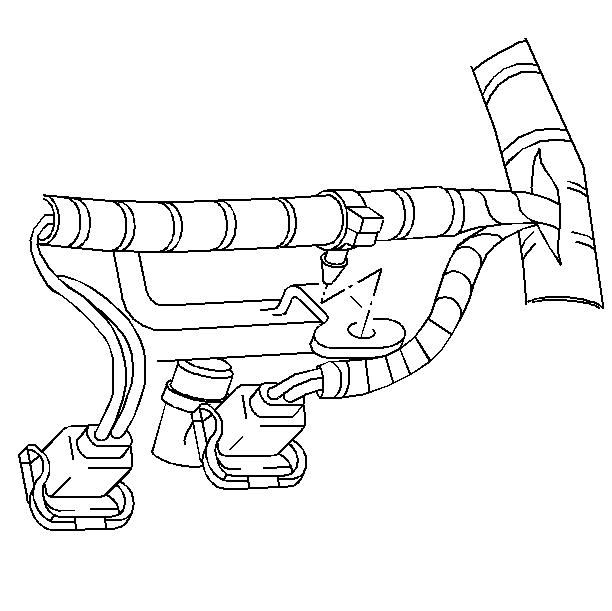
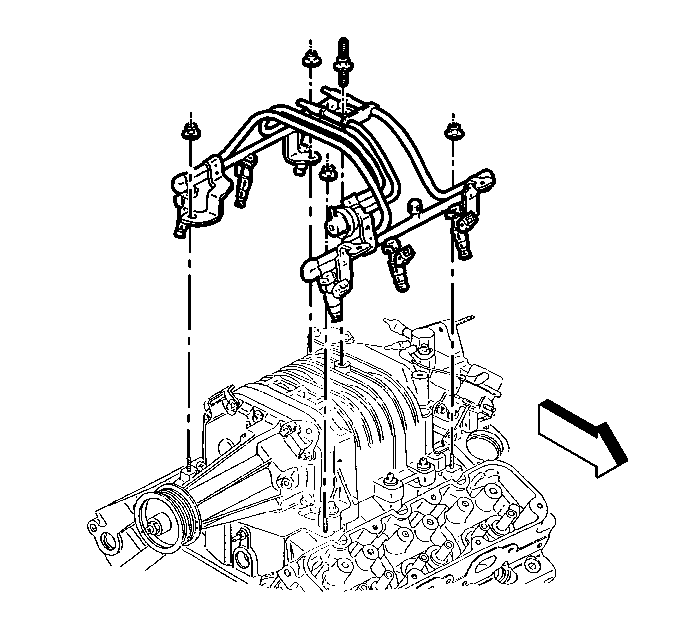
Installation Procedure
Caution: In order to reduce the risk of fire and personal injury that may result from a fuel leak, always install the fuel injector O-rings in the proper position. If the upper and lower O-rings are different colors (black and brown), be sure to install the black O-ring in the upper position and the brown O-ring in the lower position on the fuel injector. The O-rings are the same size but are made of different materials.
Notice:
• Use care when servicing the fuel system components, especially
the fuel injector electrical connectors, the fuel injector tips, and
the injector O-rings. Plug the inlet and the outlet ports of the fuel rail
in order to prevent contamination. • Do not use compressed air to clean the fuel rail assembly as this
may damage the fuel rail components. • Do not immerse the fuel rail assembly in a solvent bath in order
to prevent damage to the fuel rail assembly.
- The O-rings must be replaced on all components that are serviced.
- Lightly oil the fuel injector O-rings with clean motor oil.
- Place the fuel rail assembly on the intake manifold.
- Seat the fuel injectors by HAND.
- Reinstall the fuel rail hold-down bolts (4).
- Reinstall the fuel rail hold down stud (1).
- Reinstall the bypass valve actuator. Refer to Supercharger Bypass Valve Actuator Replacement .
- Reinstall the rear generator mounting bracket and generator. Refer to Generator Replacement in engine electrical.
- Connect the fuel injector electrical harness clips holding harness to front of fuel rail.
- Connect the (6) fuel injector electrical connectors.
- Reinstall the ignition coil wires to coil and retainer clips on top of super charger.
- Connect the vacuum line to the fuel pressure regulator.
- Connect the fuel feed, (2) and return pipes (1) to the fuel rail tubes. Refer to Metal Collar Quick Connect Fitting Service .
- Tighten the fuel fill cap.
- Reconnect the negative battery cable. Refer to Battery Negative Cable Disconnection and Connection in engine electrical.
- Inspect for leaks.
- Install the fuel injection sight shield. Refer to Fuel Injector Sight Shield Replacement in engine mechanical.

Notice: Use the correct fastener in the correct location. Replacement fasteners must be the correct part number for that application. Fasteners requiring replacement or fasteners requiring the use of thread locking compound or sealant are identified in the service procedure. Do not use paints, lubricants, or corrosion inhibitors on fasteners or fastener joint surfaces unless specified. These coatings affect fastener torque and joint clamping force and may damage the fastener. Use the correct tightening sequence and specifications when installing fasteners in order to avoid damage to parts and systems.
Tighten
Tighten the fuel rail hold-down bolts to 10 N·m (7 lb ft).
Tighten
Tighten the fuel rail hold-down stud to 25 N·m (18 lb ft).




| 16.1. | Turn the ignition switch ON for 2 seconds. |
| 16.2. | Turn the ignition switch OFF for 10 seconds. |
| 16.3. | Turn the ignition switch ON. |
| 16.4. | Check for fuel leaks. |
